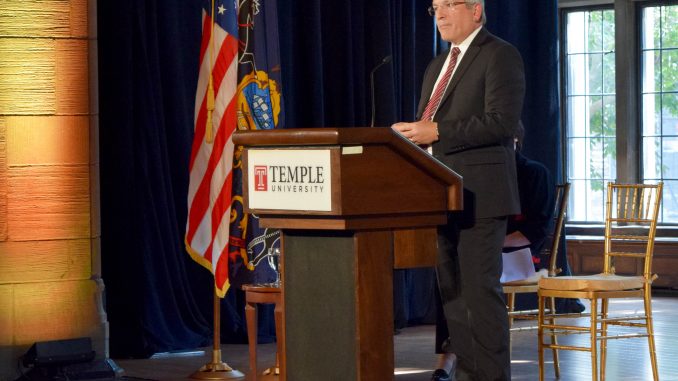
Over the last three years, President Theobald’s inaugural “six commitments” to the university have evolved in progress and in focus.
In Theobald’s inaugural address of 2013, he outlined his original “six commitments” to Temple. In the 2014 “State of the University” address, he emphasized Temple’s progress toward these commitments. The most recent address focused on the university’s rising rankings and “recommitting to excellence.”
The “six commitments” Theobald has dedicated his presidency to are: engaging in Philadelphia, a commitment to affordability, improving research, maintaining a diverse student population, making progress through entrepreneurship and telling the “Temple story.”
Theobald said the most notable advancements of 2014 included growth in research and technology, national media attention, a rise in rankings, campus development and seeking to meet students’ financial needs.
Temple also made efforts throughout 2014 to engage the Philadelphia community, Theobald said, from donating computers to Duckrey Elementary School to committing $1 million to create educational programs and career training to the Norris Apartments tenants. These interactions were aimed toward North Philadelphia specifically.
In the most recent address, Temple’s engagement with Philadelphia was less localized to North Philadelphia and more spread out throughout the city as a whole.
Theobald cited Temple University Hospital’s role to “meet the needs of the underserved” and touted the hospital’s response to the Amtrak derailment in May.
Temple sought to meet students’ financial needs in 2014 by adding about $10 million in financial aid and promoting the “Fly in 4” program, which aims to help students graduate in four years, thus limiting their debt.
In 2015, Theobald said the university more than doubled its fundraising over the past three years, adding almost $20 million to financial aid and doubling fundraising, with $11 million of raised funds going toward student support.
“We’re keeping our commitment to affordability,” he said.
2014’s growth in research came primarily from funding through a 32 percent increase in federal research funding, as well as externally sponsored research.
This year’s research achievements were highlighted in the national news, Theobald said. Most notably, the research projects included Kamel Khalili’s work toward a permanent cure for HIV/AIDS and Benjamin Seibold’s study of automated vehicles to control traffic flow.
The Temple student population appears to remain diverse, with the class of 2018 being “record breaking,” Theobald said, including more than 900 international students, representing 76 countries.
“We have a great diversity story to tell,” Theobald said of the class of 2019.
The new class had a 20 percent increase in African-American students and a 26 percent increase in Latino students. International students represented 49 countries, and one in five students are from Philadelphia.
Theobald said he hopes this will encourage students to remain in the city after they graduate, preventing “brain drain” and building up Temple’s local reputation.
Entrepreneurship within the university did not seem as simple to quantify, despite the Fox School of Business reaching ranking as one of the top 15 entrepreneurship programs in the country.
“A barrier we face is the lack of an incubator facility where entrepreneurs can work collaboratively on their ideas,” Theobald said in his 2014 address. “We expect to narrow down the options later this year and begin to address that need in early 2015.”
No such facility was mentioned in the 2015 address. Temple Ventures, a startup booster to turn “Temple-born technology into viable businesses,” and Blackstone Launchpad, also a startup booster, were two examples of innovation and entrepreneurship that were discussed.
“Telling the Temple story” took form in 2014 by way of the Take Charge marketing campaign, which uses photos and videos with the purpose of showcasing Temple to the world.
Despite greater national attention, Temple is not without its less-than-positive press, Theobald said.
“Sometimes we become associated with a story we cannot celebrate, and we have to hunt a little harder for a silver lining,” Theobald said of the Cosby controversy over the past year.
Theobald encouraged “recommitting to excellence” to continue to improve upon the original six commitments.
Lian Parsons can be reached at lian.parsons@temple.edu or Twitter @Lian_Parsons.


Be the first to comment